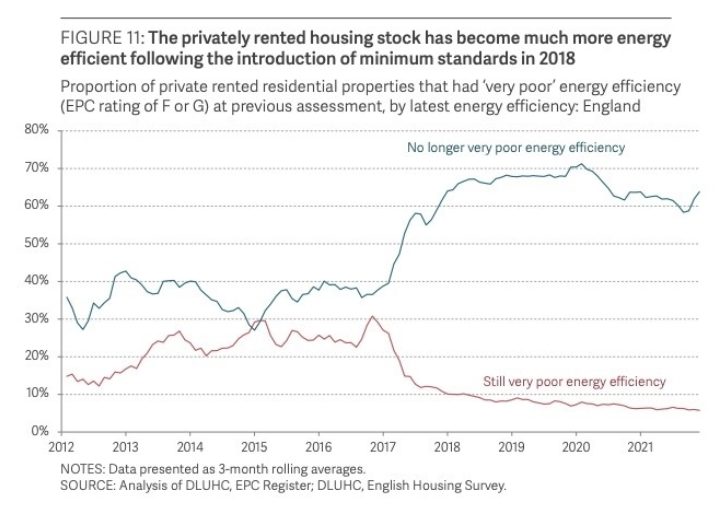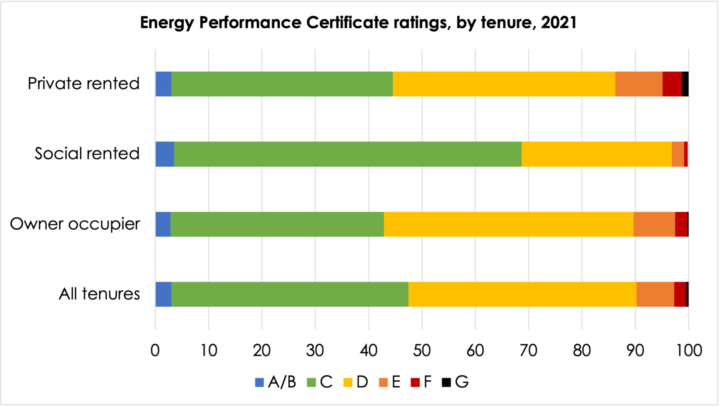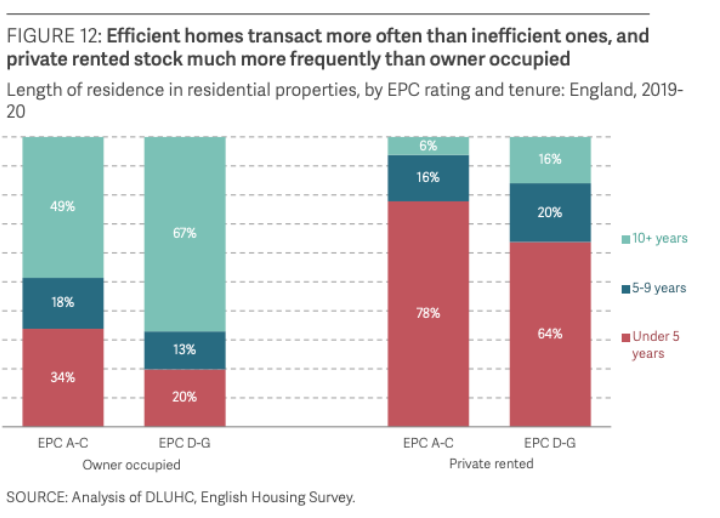Will new energy efficiency standards for privately rented homes send landlords packing?
Tightened energy efficiency standards could help to improve some of the worst performing housing in the UK - but what could be the effects on the private rental market?

By Jess Ralston
@jessralston2Share
Last updated:
Renters could soon find themselves in cosy homes, the sound of wind whistling and sky-high bills a distant memory. But what will this mean for the landlords being asked to front the cash for upgrades?
The Minimum Energy Efficiency Standards (MEES) currently in discussion are designed to stop energy being wasted. Under the rules, all new tenancies would need to be EPC band C from 2025, and all existing tenancies from 2028.[1] EPCs, or Energy Performance Certificates, measure the energy efficiency of a home, with A being the most efficient and G the least.
Landlord’s costs for upgrades would be capped at £10,000 and there would be exemptions where it’s not cost-effective, practical or affordable, such as in listed properties.
Will landlords go and what if they do?
The Government blocked landlords from renting out the most poorly insulated EPC band F and G homes in 2018. Research from the Resolution Foundation showed that there was a small decrease in private rentals from 4.7 to 4.4 million between 2017 and 2021, but this may have been down to other regulations coming into force and lucrative tax breaks ending at the same time.
And the latest official figures show the private rental sector is actually increasing, with 4.6 million households renting privately in 2022.

The impacts of various changes to the rental market are unclear, even to the industry itself. Ben Beadle, leader of the National Residential Landlords Association, was recently found contradicting himself about whether landlords are leaving the market and told members that the growth in number of landlords isn’t “terribly helpful” for their pushback against new regulations.
A recent survey by Citizen’s Advice also showed that over half of landlords think that it is their responsibility to carry out improvements, rather than the Government’s.
If landlords find the cost of energy efficiency upgrades insurmountable and are driven out of the sector, their properties may be bought by first time buyers or other landlords who can afford to make improvements. The housing stock in circulation is unlikely to be reduced by an exit of landlords, and renters-turned first-time buyers could benefit from their departure.
Conditions in private rentals are the worst of any housing sector
Private renters are more likely to find themselves in cold, damp, droughty homes than those in social housing or homeowners, as these properties are in the worst condition. Around 1.6 million children live in rented homes that are damp, mouldy and cold. Sitting in leaky homes with spiralling energy costs, almost a third of renters say they feel unable to heat their homes to a comfortable temperature.

More than half (55%) of private rented homes will need improvements to meet the planned standards, and a upgrading a property’s EPC can make a real difference. Renters in homes with an EPC of D-G are 73% more likely to suffer from damp than those in homes with EPC A-C.
But it isn’t just a matter of comfort, as research has found that cold homes are taking a toll on public health and costing the NHS an estimated £540 million a year. Home upgrades help the NHS – the Department of Health found that for every £1 spent keeping homes warm, 42p is saved in health costs.
Private renters have been paying £800 per year more on their energy bills because of poor energy efficiency, to a total of £2.3bn between the Government’s consultation on the tightened standards closing in 2021 and mid-2023. Plus, research shows another two year delay could cost a further £1bn. During the worst cost of living crisis in decades, this is a bitter pill to swallow for many.
Some landlords may independently upgrade their homes to meet EPC C, but renters and the NHS would benefit from tighter regulations. And there could be some quick wins; 60% of private landlords have not done any of the jobs recommended on the EPC, over double the proportion of housing association landlords (26%).
Landlords’ investments can be recouped
Landlords could actually be set to gain from the new rules. Research shows more energy efficient homes can be both rented and sold for a higher price, allowing landlords to recoup the costs, while tenants have warmer homes and lower bills.
Capping upgrade costs to landlords at £10,000 could mean returns for the homeowner, as government data shows the average price of improvement is lower at £7,390. The current average UK house price is £290,000, means that if homes with a higher EPC sell for 4% more as research suggests, upgrade costs will be made back at the point of sale with an average bonus of £4,210.
Tenants’ bills will be reduced by the improvements – by £276 a year on average – so landlords may rent out energy efficient properties at a higher rate. With lower bills for tenants, and landlords able to recoup the initial outlay and derive longer term benefits from their investment, it would be a win-win for both parties.

Are politicians buying the landlords’ pushback?
Politicians are giving landlords’ claims that they’ll be pushed out by regulations short shrift. Conservative MPs have come out swinging, counter-claiming that landlords are “being caught red-handed making up stories…to scare politicians”, and Labour’s position is broadly that the regulatory changes aren’t coming soon enough.
Private rented homes are costing more in both rent and bills than ever before. It’s hard to see how a decent landlord could refuse investing in energy efficient upgrades, particularly when it’s clear the money will be made back in higher rents and sale prices.
[1] Energy Performance Certificates (EPCs) measure the energy efficiency of homes, with A being the most efficient and G the least. Currently, landlords can let out homes that are a minimum of EPC band E. Home improvements such as wall and roof insulation and replacing windows raise a property’s EPC.
Share